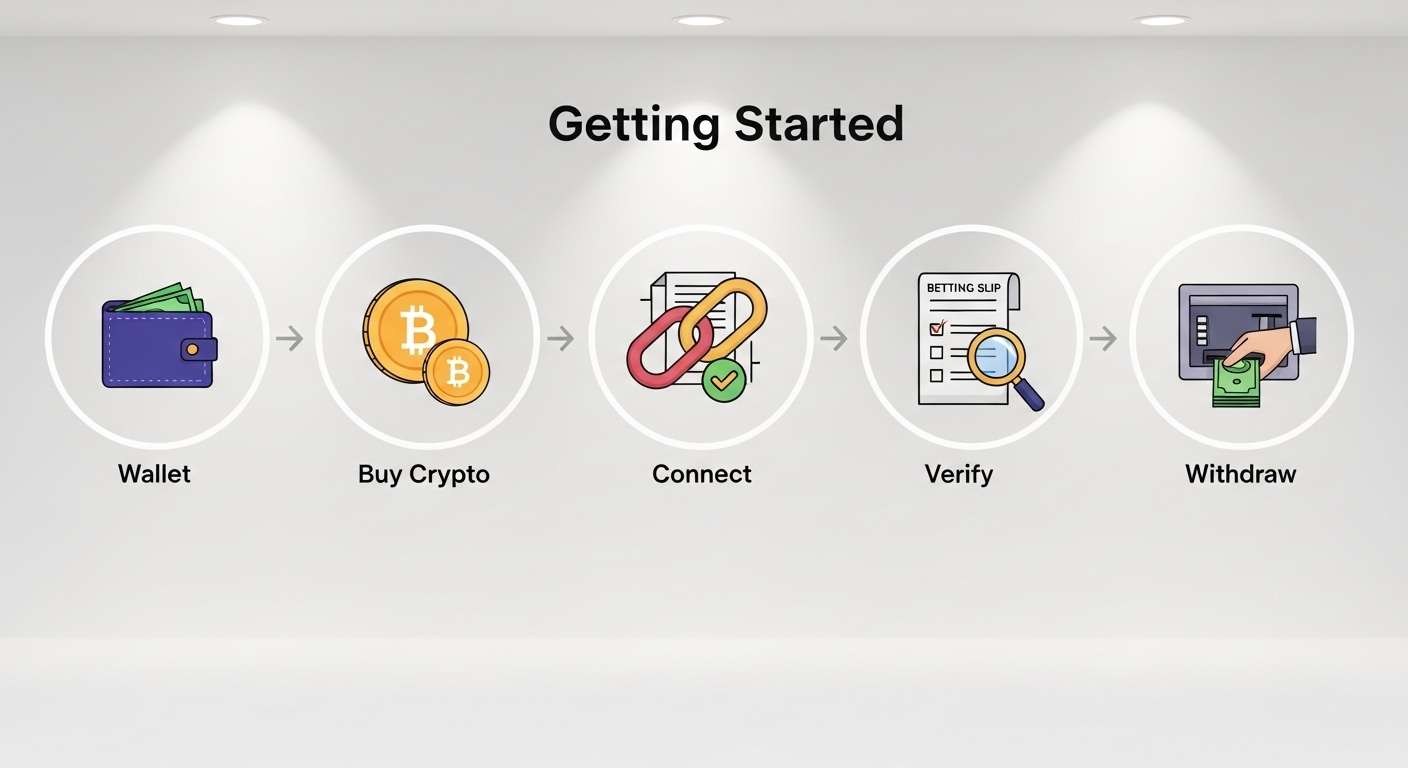#On-Chain Casinos: From Telegram Bots to Decentralized Tables
#Introduction — Two Players, One Pool
Whale Lens: In Monaco, “The Swan” pushes $3,000,000 USDC into a blackjack smart contract. No managers, no approval queues—code alone decides whether his fortune doubles or disappears. His driver waits downstairs; the bet has already settled.
Retail Lens: Across the world, “CryptoCryptid” types /bet 0.05 ETH on Arsenal +1.5 into a Telegram bot. A few seconds later, his wallet pings with winnings. He spent less time betting than microwaving noodles. The same blockchain rails power both plays.
Two lenses, one ecosystem. This is the reality of on-chain casinos in 2025.
#What Is an On-Chain Casino?
Whale Lens: High-net-worth players are tired of opaque logs and settlement lags. On-chain casinos let them verify code, audit fairness, and withdraw six-figure winnings without a compliance call.
Retail Lens: Weekend punters want two-second withdrawals, meme-friendly games, and provably fair dice rolls they can share in Discord. On-chain casinos give them that autonomy.
Unlike traditional crypto casinos that only take deposits in BTC or USDT, on-chain casinos embed the entire betting lifecycle—placement, random number generation, resolution, and payout—into smart contracts. Every shuffle, spin, and deal is public, auditable, and immutable.
Advantages:
Transparency: Every transaction is visible on-chain.
Fairness: Outcomes driven by cryptographic randomness (e.g., Chainlink VRF).
Instant Payouts: Funds release automatically once the condition resolves.
Borderless Access: Anyone with a wallet can join, subject to local laws.
But problems persist: high gas fees, UX friction, and reliance on oracles. On-chain fairness is not the same as frictionless play.
Editor’s Pick:
Blockchain Online Gambling: Faster Payouts & Provable Fairness
On-Chain Betting Explained: What It Means for Players in 2025
#The Tech Stack and Blockchains in Play
Whale Lens: Big players prize security and liquidity depth. They prefer Ethereum mainnet or audited L2s, where settlement finality and capital protection trump costs.
Retail Lens: Micro-bettors need $0.01 gas fees and instant UX. They are more likely to gravitate toward Solana or Polygon, where throughput allows $5 bets without friction.
Key Layers:
Blockchains: Ethereum (secure but costly), Solana (fast but younger ecosystem), Polygon/Arbitrum (L2 scaling solutions).
Randomness Oracles: Verifiable Random Functions (VRF) like Chainlink.
Relayers: Handle meta-transactions so casual bettors aren’t burdened with gas.
Bridges & Settlement: Cross-chain liquidity critical for whales.
The network choice reflects the player profile: whales prioritize safety, retail chases speed.
#From Telegram Bots to DAO Tables
Whale Lens: Some whales bypass bots entirely, interacting directly with dApps for complete transparency and larger transaction limits.
Retail Lens: Most casual bettors encounter on-chain casinos via Telegram or Discord bots. These abstract away complexity, letting them place bets like sending a message.
Bot Flow: Command → Bot verifies wallet → Relayer sends transaction → Smart contract executes → Payout.
DAO Tables: Fully decentralized casinos now experiment with NFT-based “seat rights” and governance votes on table odds. The UX is rough, but whales see the appeal: governance tokens, syndicate pooling, and liquidity yield.
#Regulatory & Compliance Labyrinth
Whale Lens: VIP hosts stress KYC and source-of-funds checks. Whales often play through hybrid models that meet minimal compliance while still granting high limits.
Retail Lens: Small players frequently fall into offshore sites that skip KYC. The risk? Funds frozen if regulators crack down.
Jurisdictions:
UK: UKGC requires full SoF checks; no crypto-only casinos have licenses to date. (UKGC April 2025 AML guidance)
US States (NJ, NV, PA, MI): Crypto gambling largely prohibited; regulators monitor offshore marketing.
Canada (Ontario, AGCO): Limited pilots for crypto payment integration under AML controls.
EU: Patchwork, with Malta and Gibraltar offering offshore licensing frameworks.
Risks: Offshore casinos are often used for laundering. A TRM Labs 2024 study found Chinese shadow banking networks routing billions through crypto casinos at 1–2% fees.
#On-Chain Casinos in Practice
Whale Lens: Whales favor deep liquidity pools. For instance, prediction markets like Polymarket have seen multi-million-dollar wagers, with payouts verifiable on-chain.
Retail Lens: Degens swarm slot machines and dice bots, where meme culture meets provable fairness.
Market Data:
Crypto casinos generated ~$81bn GGR in 2024 (Chainalysis report).
On-chain gambling accounted for 17% of all crypto gaming volume Q3 2024.
Verified jackpots: from 11,000 BTC dice wins (2014) to $48m on Polymarket in late 2024.
Editor’s Pick:
#Risks, Limitations & Pain Points
Gas Spikes: Ethereum congestion makes small bets uneconomical.
Front-Running: Bots can manipulate pending transactions.
Oracle Risk: RNG failures freeze games.
Contract Bugs: Even audited code has exploits.
Liquidity Drain: Whales can collapse pools with large withdrawals.
UX Friction: Wallet setup still scares non-crypto natives.
Pro Tip: Start with disposable sums. On-chain casinos are immutable—if code malfunctions, your funds may be unrecoverable.
#Future Directions
DeFi + Gambling Fusion: Idle bankrolls staked for APY while awaiting bets.
NFT Seats: Tokens grant entry and governance at high-stakes tables.
Cross-Market Hedging: Tokenized odds traded like derivatives.
Hybrid Models: Off-chain order books with on-chain settlement.
#Getting Started — Step-by-Step

1. Wallet Setup: Download a trusted wallet (MetaMask, Phantom).
2. Acquire Crypto: Buy ETH/USDT/USDC via regulated exchanges.
3. Choose Platform: Vet audits, licenses, community reviews.
4. Place Bet: Connect wallet, approve smart contract.
5. Monitor: Use block explorers for verification.
6. Withdraw or Stake: Some platforms let idle balances earn yield.
Red Flags: No audits, withdrawal delays >48h, unverifiable contracts, anonymous teams.
#FAQ
Q1. How is an on-chain casino different from a crypto casino?
A crypto casino takes crypto deposits but keeps logic off-chain. On-chain casinos execute bets, randomness, and payouts entirely via smart contracts.
Q2. Is on-chain gambling legal?
Varies by jurisdiction. UK, US, and Canada impose strict controls; many platforms operate offshore.
Q3. Do I always pay gas fees?
Often yes, but some use meta-transactions to subsidize fees.
Q4. What are the risks?
Contract exploits, regulatory crackdowns, gas volatility, and liquidity shortages.
Q5. Can idle funds earn yield?
Yes. Some casinos pool idle balances into DeFi protocols for APY.
